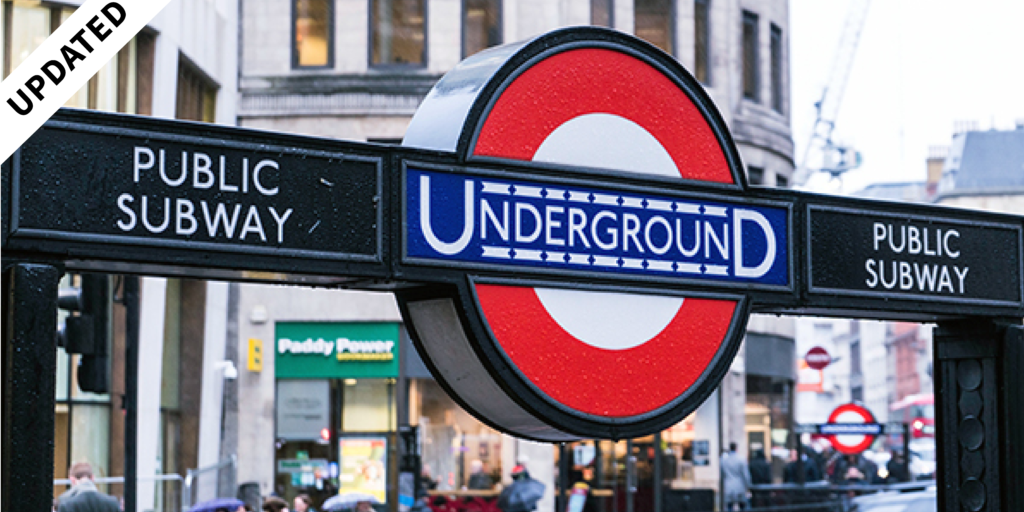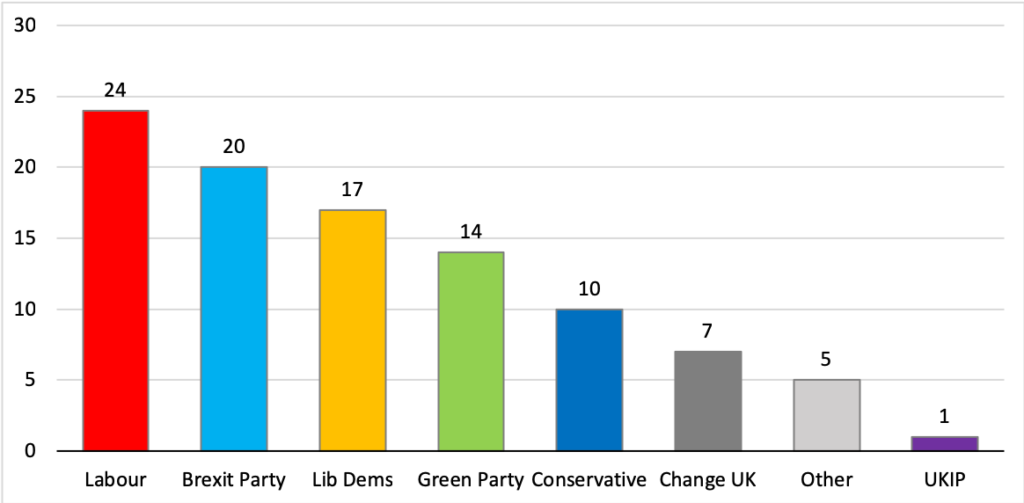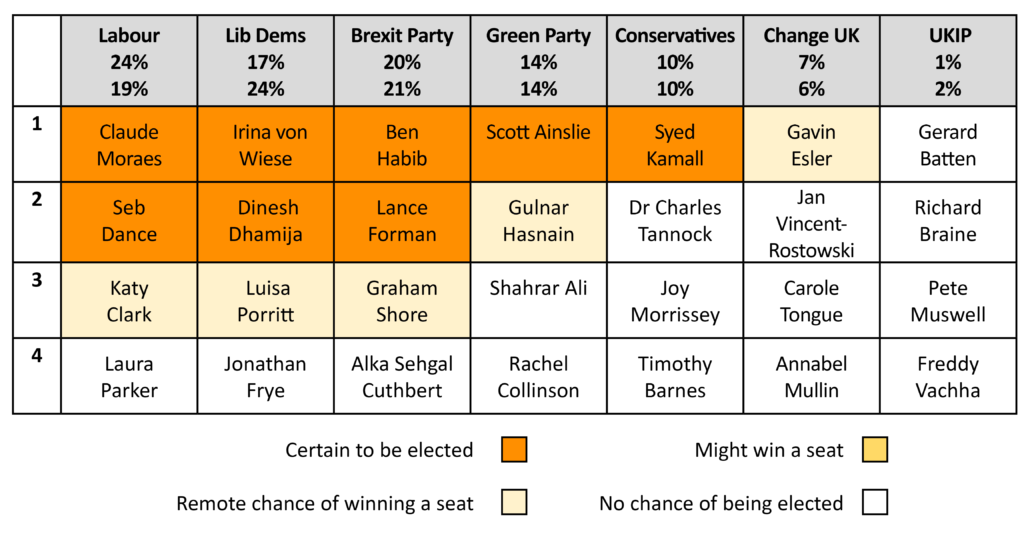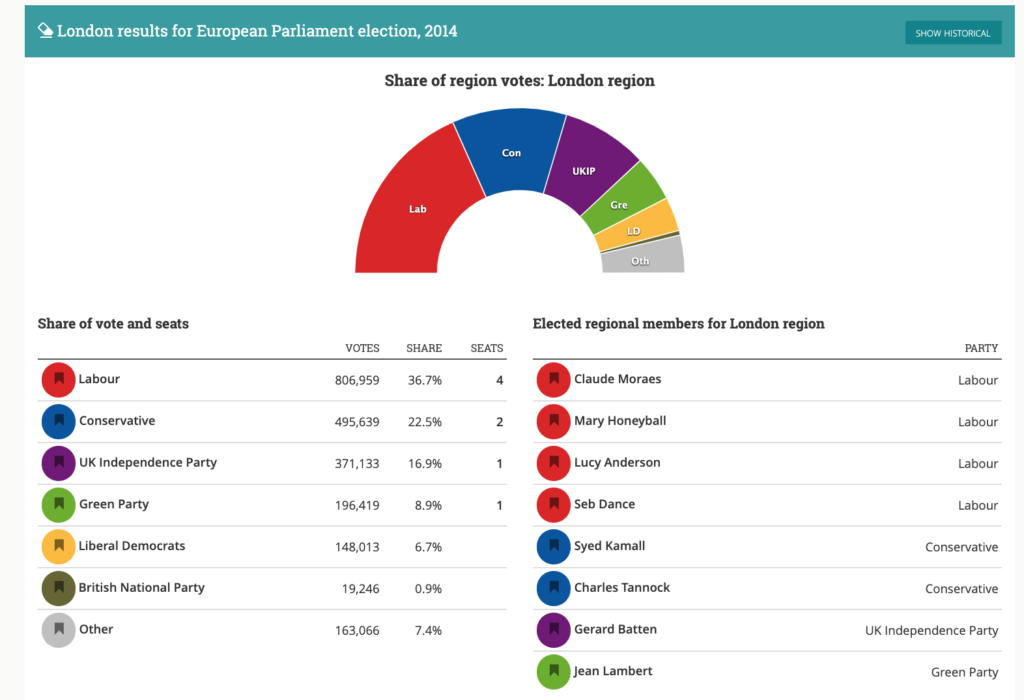European elections 2019: what will happen in London?
With eight seats to play for, London is the jewel in the crown of the European Parliament elections, and the area certain to get most media attention. Long a bastion of Remainers (voting 60:40 to stay in Europe in 2016) the capital has also been increasingly strong for Labour in recent years. However, Corbyn’s ambiguity over his EU stance seems to have recently begun to erode the party’s standing, especially for the European Parliament elections. Two recent polls give the Liberal Democrats two seats, and one has them beating Labour into first place. Brexit Party poll ratings are relatively weak in the capital, but they are still on track to win two seats. The Greens and Tories seem sure of winning a seat each. And Change UK still has some chance here. With voters able to cast only a single vote for a party list in this PR election, the Democratic Audit team reviews the likely outcomes for the parties, and looks at who the potentially electable candidates are.

London Underground sign. Photo by Joseph Balzano on Unsplash
Note: This article was first published on 16 May and updated on 23 May to take into account the latest polling data.
In the 2017 general election Labour won 55% of the votes in Greater London (and 49 of the city’s 73 seats), cementing Sadiq Khan’s winning the mayoralty in 2016, and a string of local council victories. Back in 2014 Labour also topped the last European election polls, gaining four of the capital’s eight seats on 37% support (see Figure 3 below for full 2014 results). Yet current opinion polls (which are far better for London than any other region) suggest that this year Labour may get only 24% of the vote, while the Brexit Party may run them fairly close on 20%.
Figure 1 from a recent YouGov/QMUL poll of London gives Labour 24%, which would mean its current MEPs would fall to two. Another national YouGov poll (with later fieldwork) puts the party on 19% in London, but they would still (just) win two seats on this basis. The capital’s pro-Remain majority seem to be punishing Labour for dithering on Brexit negotiations and a second referendum.
Brexit Party support is much lower in the capital than anywhere else in England, with both recent polls putting it on 20–21%, while their national average is in the mid-30s. The party is certain to win two seats on this basis, but no more than that.
Figure 1: YouGov/QMUL London European Parliament elections voting intention

Notes: Fieldwork: 7–10 May. Results weighted by likelihood to vote, excluding those who would not vote or don’t know. The full poll details are here.
For all the strong ‘Remain’ parties (Lib Dems, Greens and Change UK) London is favourable terrain and a key region where they must show that they are viable winners. Following their successes in recent local elections (though these did not take place in London), the Liberal Democrats are placed third in the Figure 1 at 17%, but first in a more recent YouGov poll that gives them 24%. They are on track to win two seats either way, and if their increase in support were to continue, they might have an outside chance of three MEPs. This is a marked improvement on 2014 when the party came fifth in the capital, and lost their seat.
The Greens are currently on 14% in both recent polls (up from 9% in 2014), and so look certain to win one seat (although earlier survey data was less favourable). They would need to poll around 18% to be in with any chance of securing a second seat.
The Conservatives are running in fifth place on just 10% in London on both recent polls, which is enough to retain one of their two current seats, but no more than that. This is a dramatic fall from their 23% and second place in 2014. The YouGov/QMUL poll found that 55% of 2017 Conservative voters in London were switching to the Brexit Party in 2019. Any further vote gains for Farage’s party in the capital might also mean the Tories drop below their seat-winning threshold. The Tories will have to hope that their support is more resilient on election day than the polls suggest.
The last of the pro-Remain parties is Change UK on 7% in both recent polls. Unlike their poor showing in the rest of the country, this puts them just below the threshold for winning a seat, which is likely to be around 9%. They can hope that name recognition for their lead candidate, Gavin Esler, might get them the extra increment in the polling booths they still need to win anything at all. Alternatively, with Change UK facing pessimistic national publicity, their strong Remainer supporters might choose to switch tactically to either the Lib Dems or Greens, in order to boost their chances of a fourth clear-Remain seat in London.
Finally, if London is not great territory for the Brexit Party, it is even worse for UKIP, whose leader is standing here. He is likely to get 2% or less support.
Figure 2 below shows what the latest polling evidence means for the parties winning seats. All eight of London’s seats look fairly clear cut. Labour, the Liberal Democrats and Brexit Party are each on course to win two seats. The Greens and Tories are sure of one seat each, but Change UK is not. Yet it is vital to remember that in fact only tiny margins of votes need to move to make a considerable difference to who wins seats. In that sense, there is everything still to play for. For instance, if the Tory support drops below 9% then that seat could also be in play. And if any of the three leading parties pulls clearly ahead of the others, it might just become feasible for it to win a third seat.
Figure 2: Main party candidates and possible winners in London with YouGov/QMUL London polling (7–10 May) and YouGov poll (8–17 May)

Notes: Polling numbers: the top row is taken from YouGov/QMUL London European Parliament elections voting intention. Fieldwork: 7–10 May. Results weighted by likelihood to vote, excluding those who would not vote or don’t know. The full poll details are here. Second row: YouGov published 19 May (fieldwork 8–17 May). Regional sample 1,111 respondents.
To find details of all the local candidates, and to locate your polling station, visit our Democratic Dashboard site and simply put in your postcode. The site also has full details of other recent elections in your local area.
Below we list a summary of any candidate in Figure 2 with some chance of being elected, and points you to their social media sites, so you can find out something of what they are like as a person. At the bottom of this article we also show the full 2014 results for London.
Which candidates can win seats in 2019?
LABOUR – Two of Labour’s four sitting MEPs have stood down, so the two remaining incumbents top their list, and are almost certain to be elected. Their third candidate looks unlikely to win a seat.
- Claude Moraes (Twitter: @Claude_Moraes). Moraes has been a Labour MEP since 1999, and was recently Chair of the parliament’s Civil Liberties, Justice and Home Affairs Committee. He has been rated the most influential UK MEP in the 2014–19 parliament by Votewatch.eu; you can find his voting record here.
- Seb Dance (Twitter: @SebDance; Votewatch.eu profile). First elected as MEP in 2014, Seb Dance moves from fourth to second on the Labour list this time. Since the referendum he has since gained an increased profile as a pro-European campaigner, and is supportive of a People’s Vote. He became known for the viral image of him holding a sign ‘he’s lying to you’ behind Nigel Farage in the European Parliament.
- Katy Clark (Twitter: @KatySClark). Clark is a former Labour MP for North Ayrshire and Arran (2005–15). She subsequently worked as political secretary for Jeremy Corbyn, and is considered close to him. Her position on the list is controversial, in part as her view on a second referendum is not known, and she is thought to be sceptical.
- Laura Parker (Twitter: @ParkerCiccone). Parker is a national coordinator for Momentum, and supporter of the left-wing pro-European campaign ‘Another Europe is Possible’, and of a second referendum.
LIBERAL DEMOCRATS appear to have momentum in the capital. The party’s members voted for the candidates in each region, and their order on the ballot.
- Irina von Wiese (Twitter: @IrinavonWiese). A German-born lawyer, von Wiese formerly worked for the European Commission. You can watch her acceptance speech here.
- Dinesh Dhamija (Twitter: @dinesh_dhamija). Dhamija founded the online travel company Ebookers, which he sold in 2005. He is also Deputy Treasurer for the Lib Dems.
- Luisa Porrit (Twitter: @LuisaPorritt) is a councillor in Camden and teaches at the University of London. She is a former journalist for the Economist and Reuters.
THE BREXIT PARTY – Their top candidate looks certain to be elected, and the party has a good chance of another win if the pro-Remain vote is fragmented evenly, though they are doing less well in London than elsewhere in England.
- Ben Habib (Twitter: @benhabib6). CEO of property developers First Property Group, which operates in the UK and eastern Europe, Habib has caused controversy by saying the property industry can profit from Brexit uncertainty.
- Lance Forman (Twitter: @LanceForman). Forman is owner of his family firm, H Forman & Son, a smoked salmon company based in the East End. He was previously a Conservative supporter and in the 1990s special advisor to Conservative minister Peter Lilley. Since standing, his business premises has been subject to anti-semitic graffiti.
Third on the Brexit list is the former Managing Director of Shore Capital investment fund Graham Shore, who looks unlikely to have any chance. Fourth is an educational consultant, Alka Sehgal Cuthbert (Twitter: @ASCphiled), who was one of the first few candidates showcased by the party on its launch, but has no chance at all of winning.
GREEN PARTY – The Greens’ incumbent MEP in London, Jean Lambert, is standing down but their lead candidate (selected by party members) looks very likely to win (on YouGov’s polling). The party will need a strong surge to gain a second seat.
- Scott Ainslie (Twitter: @ScottAinslie_1). Ainslie has been a Green Party councillor in Lambeth since 2014, and is an actor. You can read his candidate pitch for MEP selection here.
- Gulnar Hasnain (Twitter: @gulnarhasnain). Hasnain was Green Party candidate in the Vauxhall constituency in the 2015 and 2017 general elections.
CONSERVATIVES – Both sitting Conservative MEPs are re-standing but only one looks likely to (just) retain one seat on current polls.
- Syed Kamall (Twitter @SyedKamall; Votewatch.eu profile). Kamall has been an MEP since 2005, is Chair of the Conservative’s ECR group in the European Parliament, and voted for Brexit.
- Charles Tannock (Twitter: @CharlesTannock; Votewatch.eu profile). First elected as an MEP in 1999, Tannock voted Remain in the Brexit referendum, and is one of the founders of ‘Conservatives for a People’s Vote’.
CHANGE UK – The new pro-Remain party looks unlikely to win a seat, but by choosing a celebrity candidate to head their list the party may just gain a seat on the day. Change UK’s eclectic list of candidates includes the British-Polish economist and former Polish Minister for Finance Jan Vincent-Rostowski (Twitter: @janrostowski) at number 2, and former Labour MEP Carole Tongue (Twitter: @CaroleTongue) at 3, neither of whom has any chance on current polls.
- Gavin Esler (Twitter: @gavinesler). A former BBC journalist and Newsnight presenter, and current Chancellor of the University of Kent, Esler became active in pro-Remain politics since 2016, and you can read his reasons for standing here.
UKIP – The party’s glory days are long behind now, especially in London, and the Brexit Party has stolen its support. UKIP looks certain to lose its current seat.
- Gerard Batten (Twitter: @GerardBattenMEP; Votewatch.eu profile). Batten is the current party leader (since April 2018) and a founding member of UKIP. He has been an MEP since 2004. The party’s electoral decline has continued in his term, in part because he has welcomed controversial far-right anti-Islamic social media campaigners into the party.
Figure 3: 2014 results and MEPs

Source: Democratic Dashboard.Order elected: 1. Claude Moraes (Labour); 2 Syed Kamall (Conservative); 3 Mary Honeyball (Labour); 4 Gerard Batten (UKIP); 5 Lucy Anderson (Labour); 6 Charles Tannock (Conservative); 7 Seb Dance (Labour); 8 Jean Lambert (Green).
Read more about how the European Parliament elections work:





 Democratic Audit's core funding is provided by the Joseph Rowntree Charitable Trust. Additional funding is provided by the London School of Economics.
Democratic Audit's core funding is provided by the Joseph Rowntree Charitable Trust. Additional funding is provided by the London School of Economics.
Fascinating article – posing a lot of food for thought. Two seats are up for gain. It will be interesting to see whether Change UK can gain one.